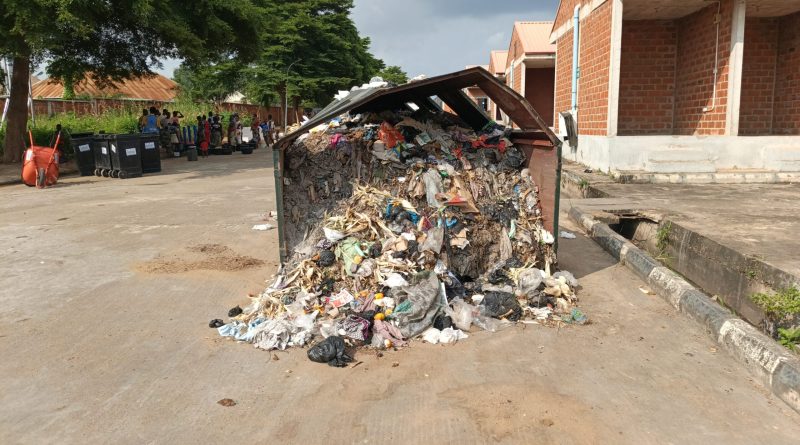Inside Benue IDP camp, where thousands live with stench
The Makurdi Ultra Modern International Market in the Benue State capital has become a makeshift camp for internally displaced people in the state. Now housing thousands of displaced people, the camp, the largest in the state capital, smells of stench and decay caused by poor sanitation and puts the health and lives of residents at risk.
Last month, when PREMIUM TIMES visited the camp, dozens of pregnant women and nursing mothers were waiting with plastic containers to fetch water, while children played football in open spaces littered with faeces and refuse, oblivious of the health risks around them.
One of the IDPS living in the camp is Terhile Gbakaan, who lost his Yelwata home during a June attack by armed herders.

Mr Gbakaan, a cobbler, said the stench of refuse and human waste now threatens his health and livelihood.
“The garbage is always here beside me, the smell is too much,” he said, adding that the poor sanitary condition now threatens his trade.
For 70-year-old Akera Aondover, life in the camp is even more difficult. A car accident during earlier violence left him with a permanent disability.
“Because I am physically challenged, I cannot struggle with able-bodied people to fetch water or queue for the few toilets,” he explained.
Without reliable access to clean water and sanitation, his daily routine has become a constant battle—depending on his children or neighbours for the simplest tasks.
“It is shameful to always rely on others, but what can I do? If cholera breaks out here, people like me will suffer first,” Mr Aondover said.
His voice reflects the fears of more than 70 people living with disabilities in the camp, many unable to reach or use the limited toilets and water points available. Although PWDs are a minority in the camp, their physical situation arguably makes their experience worse.
However, the putrid smell from the camp does not affect only the residents. At MJ Resort Bar, which shares a fence with the camp, the stench is crippling business.
“Some people come to relax, but because of the bad odour, they go away and never return,” lamented manager Joseph Shausu.
Revenue that once reached ₦200,000 a day has plummeted to as low as ₦30,000. What drives away his customers could one day drive a public health outbreak in Makurdi itself.
The United Nations Children’s Fund (UNICEF), which manages sanitation in the camp, admits it is struggling to contain the risks. “Most of these people came from places without sanitation facilities. For many, using a toilet is their first time,” said Joseph Labe, UNICEF’s WASH officer.
Though UNICEF has built 46 water closets and supplies 45,000 litres of water daily, open defecation persists. The organisation fears cholera or dysentery could erupt at any time.
The UNICEF official, however, raised a concern that could worsen the health situation in the camp.
“From what we heard, UNICEF might pull out—and the reason is funding,” Mr Labe said.
PREMIUM TIMES has reported the global funding crisis facing UNICEF and other UN organisations, caused largely by the actions of the US government. Without UNICEF’s boreholes, water trucking, and sanitation support, the situation at the Makurdi camp would degenerate and the camp would be left exposed to deadly outbreaks.
When PREMIUM TIMES asked the camp chairman, Robert Nyom of the Benue State Emergency Management Agency, about sanitation, open defecation, and the threat of UNICEF’s withdrawal, he declined to comment, directing questions to SEMA headquarters.
The displacement crisis that created this camp is already staggering. Between 13 and 14 June, suspected herders razed Yelwata, killing over 100 residents, according to Amnesty International. Nearly 6,000 fled to the Makurdi Ultra Modern International Market camp. Statewide, more than 500,000 people are displaced, according to IOM—many without adequate food, shelter or clean water.
Now, experts warn that poor sanitation may be the next killer. The World Health Organisation estimates that unsafe sanitation claims 564,000 lives every year, mostly from diarrhoeal diseases like cholera and typhoid.
Globally, 419 million people still defecate in the open. In camps like Makurdi’s, where refuse rots and toilets are too few, the WHO’s warning is not abstract.
For Messrs Terhile, Akera, and thousands of others, the smell in the air is more than an inconvenience—it is a reminder that disease could strike at any moment. Without urgent investment, the camp risks trading one crisis for another: from the violence that displaced them, to an epidemic caused by poor sanitation.


